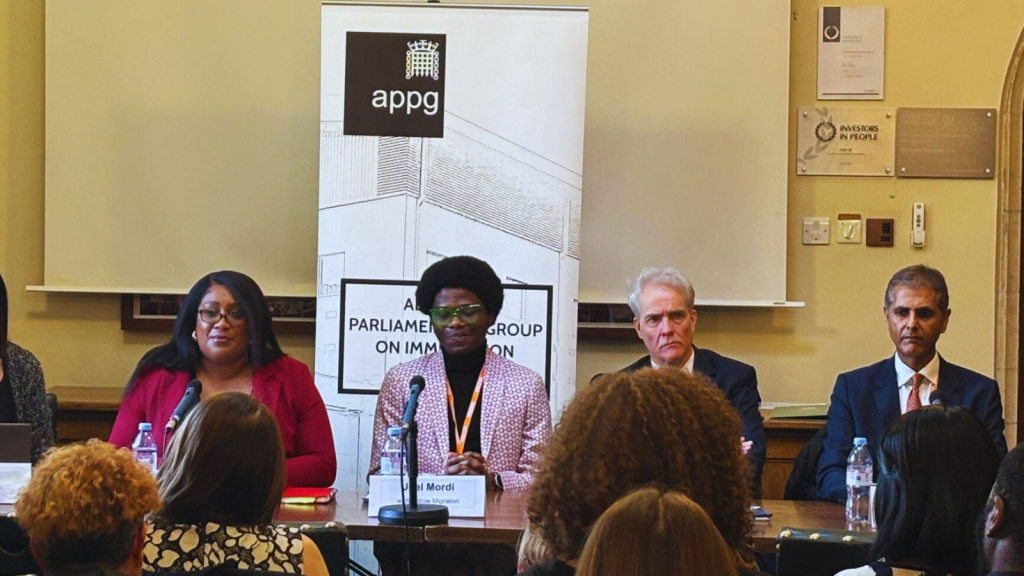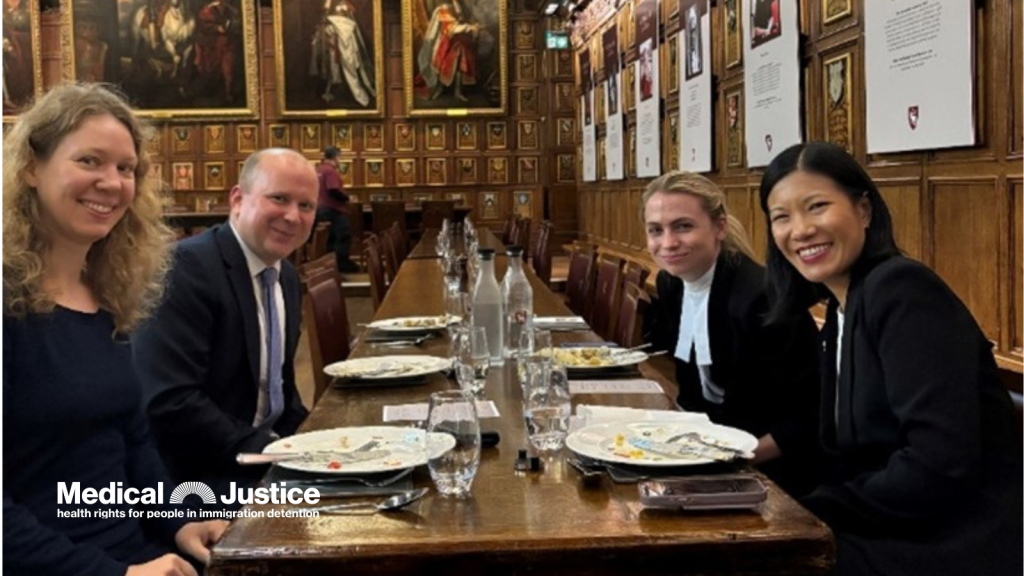With MPs and Peers back in Westminster after their summer recess, we share some updates below about Medical Justice’s work in Parliament this year, and what’s coming up.
All Party Parliamentary Group (APPG) on Immigration Detention
The APPG on Immigration Detention is a cross-party group of MPs and peers that advocates for evidence-based reforms to immigration detention policy, and the welfare of detained people. Medical Justice was instrumental in setting up the group in 2019 and has acted as its secretariat since then.
Following last year’s general election, Medical Justice helped to re-establish the APPG with Labour’s Bell Ribeiro-Addy MP elected as the group’s Chair. So far this year the group has delivered a number of high-profile activities – you can read more about each below.
Meeting with Dame Angela Eagle DBE MP, Minister for Border Security and Asylum (March 2025)
The APPG met with Dame Angela Eagle on 12 March 2025 in the House of Commons. The meeting was attended by the Minister, Bell Ribeiro-Addy MP, Baroness Lister of Burtersett, Baroness Ludford, and Elspeth Macdonald from the Secretariat, and Home Office officials.
APPG members raised issues of interest and concern, including the Home Office’s plans to expand the detention estate, alternatives to detention, implementation of the Brook House Inquiry’s recommendations, and detention-related aspects of the Border Security, Asylum and Immigration Bill 2025.
During the discussion the Minister indicated her willingness to continue engaging with the APPG, and this is something the groups plans to pursue with her successor Alex Norris MP.
Panel discussion on the current state of immigration detention in the UK (March 2025)
The APPG’s panel discussion took place on 20 March, and looked at the current state of immigration detention in the UK and its impacts on detained people.

APPG Chair and speakers at panel event on 20 March 2025
Click here to access a full summary of the meeting, including Q&As
Speakers included Joel Mordi, a Nigerian LGBTQI+ and human rights activist currently working with Rainbow Migration on their No Pride in Detention campaign. Mr Mordi was previously detained at Harmondsworth Immigration Removal Centre (IRC) and spoke about the devastating and lasting impacts that detention can have on those subjected to it, including members of the LGBTQI+ community. Mr Mordi’s speech is available in full on the APPG’s website.
Charlie Taylor, HM Chief Inspector of Prisons and Dr Hindpal Singh Bhui OBE, Inspection Team Leader at HM Inspectorate of Prisons also spoke. In 2024, Mr Taylor warned of a “worrying deterioration in safety” across UK IRCs, with an inspection of Harmondsworth IRC finding “the worst” conditions inspectors had ever seen in UK immigration detention, and serious concerns likewise reported at Brook House IRC. Mr Taylor and Dr Singh Bhui discussed these findings in more detail. They also provided an update from a recent visit to Harmondsworth where, despite good progress in some areas, a number of key concerns remain, in particular in relation to the safeguarding of vulnerable people.
Over 40 guests attended the event including parliamentarians, people with lived experience of immigration detention, and representatives from the Royal College of Nursing, the Independent Monitoring Boards, and front-line immigration and asylum charities.
Visit to Harmondsworth IRC (July 2025)
The APPG conducted a visit to Harmondsworth IRC on 24 July, attended by Bell Ribeiro Addy MP and Baroness Lister of Burtersett (pictured below).

Prompted by HMIP’s report on the IRC in 2024 (see above), the visit was an opportunity to better understand how the Home Office and current contractor Mitie have responded to the Chief Inspector’s findings. Central to the visit was a meeting with men currently held at the site who shared valuable insights about their ongoing experience of being detained at Harmondsworth and current conditions.
Prior to the visit, both the Chair and Baroness Lister also met with Bail for Immigration Detainees, JRS UK, and Medical Justice and were briefed on the organisations’ current key concerns regarding the facility.
The APPG plans to continue its engagement with Home Office and contractors, including following up on issues raised during the visit, in the coming months.
Border Security, Asylum and Immigration Bill 2025
The Border Security, Asylum and Immigration Bill was introduced in Parliament in January 2025, with the stated aim to “improve UK border security and to strengthen the asylum and immigration system”. You can read more about the Bill and the planned changes it will (and won’t) make to detention here.
As the Bill made its way through the House of Commons earlier this year, Medical Justice shared its concerns about the draft legislation and how it needs to be changed in a number of parliamentary briefings and evidence submissions.
The Bill now being looked at by the House of Lords, and Medical Justice has continued to highlight its damaging effects and advocate for key changes. This has included producing a number of briefings as part of the Coalition for Asylum Rights and Justice (CARJ):
- Joint briefing for Lords Second Reading – CARJ, including Medical Justice
- Joint briefing for Lords Committee Stage – CARJ, including Medical Justice
We have also joined calls for the introduction of a time limit on immigration detention. Medical Justice remains firm in its view that the use of immigration detention must be ended, given the known harm it inflicts on those subjected to it. We see the introduction of a time limit, which has been backed by the UK Parliament’s Home Affairs Committee and Joint Committee on Human Rights, HM Chief Inspector of Prisons, the British Medical Council and the Brook House Inquiry amongst others, as an important interim step towards achieving that ultimate goal.
An amendment to the Bill introducing such a time limit was tabled by Liberal Democrat peer and APPG members Lord German, supported by Labour’s Baroness Lister of Burtersett and the Lord Bishop of Chelmsford. Jointly with other NGOs, Medical Justice produced a detailed briefing about the amendment and why it is needed:
- Joint briefing on detention time limit amendment – Detention Action, Bail for Immigration Detention, ILPA and Medical Justice.
The amendment was debated in the Lords on 3 September 2025. In his speech, which you can watch here or read in full, Lord German said:
“I tabled this amendment because….I believe that it is a change that needs to happen. When I visited an immigration removal centre last year and spoke to detainees and staff, it was made clear to me that case progression for immigration detainees is slow and hampered by staff shortages. Further to this, detainees were unaware of the progress on their cases and when they could expect to leave detention or be removed. Communication to them was minimal and this clearly led to despair and frustration with the lack of hope for the future.”
While the Home Office Minister Lord Hanson’s response made clear that the government does not intend to support such a change, Medical Justice will continue to keep working with MPs, peers and NGO colleagues to make the case for a 28-day time limit wherever possible in Parliament and more widely.

